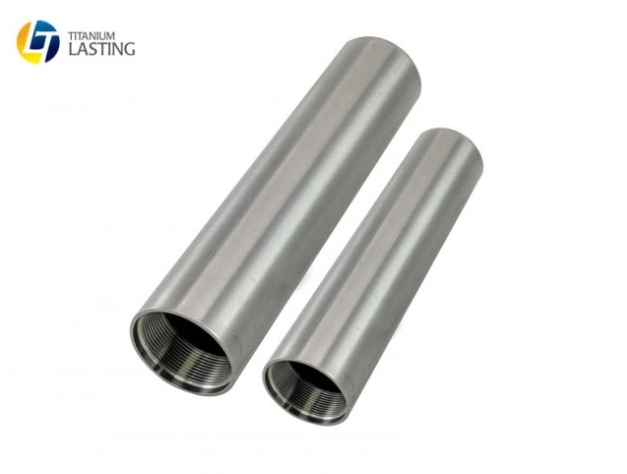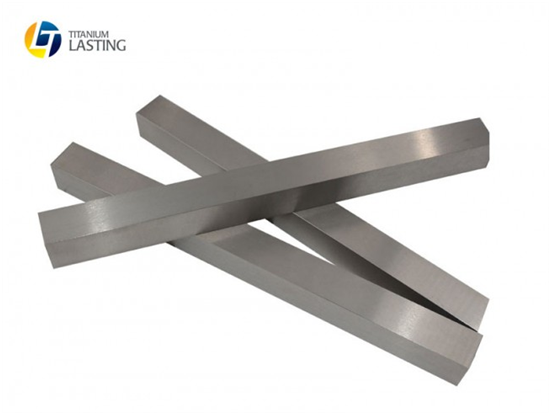Views: 368 Author: Lasting Titanium Publish Time: 2024-11-18 Origin: Site











Content Menu
● Physical and Chemical Properties of Titanium
● Advantages of Titanium Over Other Materials
● Industrial and Commercial Applications of Titanium
● Comparison Between Titanium and Titanium Alloys
Titanium and its alloys have gained significant attention in various industries due to their unique properties and advantages over other materials. This article explores the physical and chemical properties of titanium, its advantages, industrial applications, and a comparison between titanium and its alloys.
Titanium is a transition metal known for its remarkable strength-to-weight ratio. It is as strong as steel but significantly lighter, making it an ideal choice for applications where weight is a critical factor. Titanium has a low density of about 4.5 g/cm³, which is approximately 60% of that of steel.
Chemically, titanium is highly resistant to corrosion, particularly in oxidizing environments. This resistance is due to the formation of a passive oxide layer on its surface, which protects it from further oxidation. Titanium can withstand extreme temperatures, with a melting point of around 1,668°C (3,034°F), making it suitable for high-temperature applications. Additionally, titanium exhibits excellent biocompatibility, which is why it is widely used in medical implants.
One of the primary advantages of titanium is its exceptional corrosion resistance. Unlike many metals, titanium does not rust, which extends the lifespan of components made from it. This property is particularly beneficial in marine environments and chemical processing industries.
Another significant advantage is its strength. Titanium alloys can achieve high tensile strength while remaining lightweight, which is crucial in aerospace and automotive applications where reducing weight can lead to improved fuel efficiency and performance. Furthermore, titanium has a high fatigue resistance, making it suitable for components subjected to cyclic loading.
Titanium also has a low thermal conductivity, which can be advantageous in applications where heat retention is necessary. Its non-magnetic properties make it ideal for use in sensitive electronic equipment and medical devices.
Titanium and its alloys are used in a wide range of industries, including aerospace, automotive, medical, and marine. In the aerospace sector, titanium is used for aircraft frames, engine components, and landing gear due to its strength and lightweight characteristics. The aerospace industry benefits from titanium's ability to withstand extreme temperatures and corrosive environments.
In the automotive industry, titanium is increasingly used in high-performance vehicles. Components such as exhaust systems, connecting rods, and valves are made from titanium alloys to reduce weight and improve performance. The automotive sector values titanium for its ability to enhance fuel efficiency and reduce emissions.
The medical field utilizes titanium for surgical implants, dental implants, and prosthetics. Its biocompatibility ensures that it can be safely used within the human body without causing adverse reactions. Additionally, titanium's strength and corrosion resistance make it an ideal material for long-lasting medical devices.

While titanium is a strong and versatile material, titanium alloys offer enhanced properties that make them even more suitable for specific applications. Titanium alloys are categorized into three main types: alpha (α) alloys, beta (β) alloys, and alpha-beta (α-β) alloys.
Alpha alloys are known for their excellent weldability and corrosion resistance but are not heat-treatable. Beta alloys, on the other hand, can be heat-treated to improve their strength and are often used in applications requiring high strength at elevated temperatures. Alpha-beta alloys combine the benefits of both types, offering a balance of strength, ductility, and weldability.
When comparing titanium to its alloys, it is essential to consider the specific requirements of the application. For instance, while commercially pure titanium is suitable for applications requiring high corrosion resistance, titanium alloys may be preferred in situations where additional strength or heat resistance is necessary.

In summary, titanium and its alloys are exceptional materials that offer a unique combination of properties, making them suitable for a wide range of applications. Their strength, lightweight nature, and corrosion resistance provide significant advantages over traditional materials. As industries continue to seek innovative solutions, the demand for titanium and its alloys is expected to grow, further solidifying their role in modern engineering and manufacturing.
This technical deep-dive explores the critical factors in selecting titanium square bars for advanced machining. It analyzes the metallurgical differences between Alpha and Beta phases, the mechanical implications of forging versus rolling, and the rigorous requirements of AMS 4928 versus ASTM B348 standards. The article provides professional strategies for managing titanium's low thermal conductivity and modulus of elasticity, emphasizing the importance of alpha-case removal and high-pressure cooling. Targeted at industry insiders, it bridges the gap between material science and practical CNC production for aerospace and medical applications.
This technical analysis explores the application of titanium square bars (specifically Ti-6Al-4V) in the automotive sector. It details the material's metallurgical advantages, its role in improving NVH performance compared to steel, and its economic value in EV weight reduction. The article also provides professional insights into CNC machining, advanced joining methods like Electron Beam Welding, and the strategic importance of square bar geometries in modern vehicle engineering. (415 characters)
This technical guide explores the complexities of titanium square bar standards (ASTM B348, AMS 4928) and manufacturing processes. It delves into the chemistry of Alpha Case formation, the advantages of Grade 12 as a Pd-free alternative, and the necessity of PAUT/Immersion testing to solve corner "dead zones" in square profiles. Aimed at industry professionals, the article clarifies the differences between rolled and forged bars while emphasizing microstructural integrity, including primary alpha morphology and prior-beta grain refinement, for high-performance applications.
This technical analysis explores the metallurgical and mechanical advantages of using Titanium Square Bars (ASTM F136/F67) in medical device manufacturing. It highlights how square profiles improve CNC machining stability, reduce material waste, and enhance the fatigue life of implants through refined forging and superior microstructural homogeneity. By focusing on interstitial control and substrate purity, this guide illustrates why square bar stock is the strategic "Gold Standard" for high-precision orthopedic and spinal applications.
This article discusses the essential certifications for titanium pipe fittings, including ASTM and ASME standards, API certification, CE marking, NACE certification, ISO 9001, NADCAP accreditation, and material certification. It emphasizes the importance of these certifications in ensuring quality, safety, and compliance in various applications, particularly in aerospace, chemical processing, and marine industries.
This article explores the reasons aerospace OEMs rely on titanium fasteners, highlighting their unique properties such as strength-to-weight ratio, corrosion resistance, and high-temperature tolerance. It discusses applications in structural components, compatibility with composites, and the economic impact of titanium fasteners. The article also addresses challenges in manufacturing and supply chain management while looking ahead to innovations and sustainability in the titanium industry.
This article provides a comprehensive guide on identifying high-quality titanium fasteners from reliable suppliers. It covers key characteristics of quality fasteners, supplier evaluation criteria, and quality assurance practices essential for ensuring safety and performance in various applications. By following these guidelines, industry professionals can make informed decisions when sourcing titanium fasteners.
This article explores the top five applications where titanium fasteners are essential, including aerospace, marine engineering, chemical processing, automotive, and medical devices. It highlights the unique properties of titanium fasteners that make them suitable for harsh environments and discusses their benefits in various industries.
This article explores how titanium fasteners reduce maintenance costs in harsh environments. It highlights their unique properties, applications in various industries, and the economic advantages they offer. Despite higher initial costs, the long-term savings and reliability make titanium fasteners a preferred choice for demanding applications.
This article explores the investment value of titanium fasteners for long-term performance, highlighting their unique properties, applications, and cost considerations. It emphasizes the advantages of titanium fasteners, including corrosion resistance, durability, and weight savings, while addressing challenges such as initial cost, machining difficulties, and thread galling. The article concludes with practical insights and frequently asked questions to assist industry professionals in making informed decisions regarding titanium fasteners.
This article explores the environmental benefits of using titanium round bars in manufacturing, highlighting their unique properties, applications, and contributions to sustainability. It emphasizes reduced waste generation, energy efficiency, and recyclability, while addressing challenges such as initial cost and machining difficulties. The article concludes with practical insights into the role of titanium in promoting eco-friendly manufacturing practices.
This guide explores the investment potential of titanium square bars, highlighting their unique properties, applications, and cost considerations. It emphasizes the long-term value of titanium in various industries, including aerospace, medical, and marine, while addressing challenges in sourcing and machining. The article concludes with practical advice for selecting suppliers and understanding the benefits of investing in titanium square bars.
This article provides an in-depth overview of titanium square bar specifications, covering material grades, standards, dimensions, surface finishes, and applications. It highlights the importance of understanding these specifications before purchasing, ensuring informed decisions for various industrial applications.
This article explores the top five applications of titanium and titanium alloy square bars in modern engineering, highlighting their significance in aerospace, medical devices, automotive, marine, and chemical processing industries. The unique properties of titanium, such as high strength-to-weight ratio and corrosion resistance, make it an essential material for innovative engineering solutions.
This article explores the global demand for high-grade titanium wire, focusing on key industries, regional demand, technological innovations, and challenges. It highlights the importance of titanium wire in aerospace, medical, and chemical processing sectors, emphasizing the need for manufacturers to adapt to evolving market dynamics.
This article explores the superiority of titanium wire in chemical processing industries, highlighting its exceptional corrosion resistance, mechanical properties, cost-effectiveness, and environmental benefits. It discusses various applications and use cases, emphasizing the material's role in enhancing equipment longevity and reliability.
This article provides a comprehensive guide on selecting the right titanium wire for industrial applications. It covers essential factors such as application requirements, titanium grades, diameter considerations, and manufacturing processes. The article also highlights the various applications of titanium wire in industries like aerospace, medical, chemical processing, and marine. By understanding these aspects, industry professionals can make informed decisions when choosing titanium wire for their projects.
This article explores the key benefits of using titanium square bars in marine projects, highlighting their exceptional corrosion resistance, high strength-to-weight ratio, biocompatibility, and durability. The versatility of titanium square bars makes them suitable for various marine applications, contributing to long-term cost-effectiveness and environmental sustainability. Investing in titanium ensures superior performance and longevity in marine operations.
This article explores the pros and cons of titanium tubes versus nickel alloy tubes for industrial use. It highlights the unique properties, advantages, and disadvantages of each material, along with their applications in various industries. The choice between these materials depends on specific application requirements, including cost, strength, and corrosion resistance.
This article explores the advantages of titanium tubes in aerospace fuel lines, highlighting their high strength-to-weight ratio, corrosion resistance, and thermal stability. It discusses their applications in fuel systems, hydraulic systems, and engine components, while also considering the future of titanium in aerospace, including innovations in manufacturing and expanding applications.
